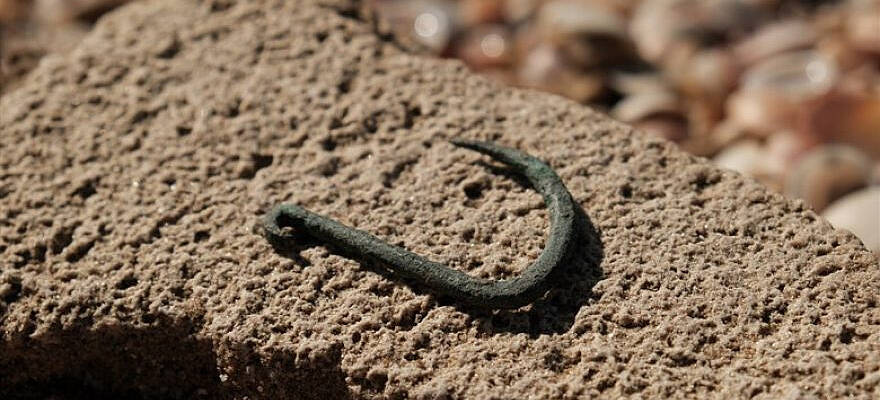The hook, most likely used for catch sharks or other large marine animals, will be exhibited on April 3 at the 48th Archaeological Congress.
By JNS
A copper fishhook thought to be 6,000-year-old —one of the oldest ever found—was discovered in 2018 during excavations prior to the construction of the new Agamim neighborhood in Ashkelon, the Israel Antiquity Authority (IAA) announced on Wednesday.
The hook, most likely used to catch sharks or other large marine animals, will be exhibited on April 3 at the 48th Archaeological Congress.
“This unique find is 6.5 cm long and 4 cm wide, its large dimensions making it suitable for hunting 2–3 m long sharks or large tuna fish. More ancient fishhooks found previously were made of bone and were much smaller than this one,” said the IAA’s Yael Abadi-Reiss, co-director of the excavation.
“The use of copper began in the Chalcolithic period, and it is fascinating to discover that this technological innovation was applied in antiquity for the production of fishhooks for fishermen along the Mediterranean coast,” she added.
In the Chalcolithic period there were large villages around Ashkelon, whose economies were based on agricultural practices still common today, such as the pasturing of sheep, goat and cattle, the cultivation of wheat, barley and legumes and the tending of fruit orchards.
“We learn about the dietary habits of the people who lived here 6,000 years ago from the remains of animal bones found in ancient rubbish pits, from burnt wheat grains found in ovens, and from the hunting, cooking and food-processing tools retrieved, including flint sickles, and a variety of pottery vessels that served for the storage, cooking and the conservation of food by fermentation and salting,” said Abadi-Reiss.
“The rare fishhook tells the story of the village fishermen who sailed out to sea in their boats and cast the newly invented copper fishhook into the water, hoping to add coastal sharks to the menu,” she added.
